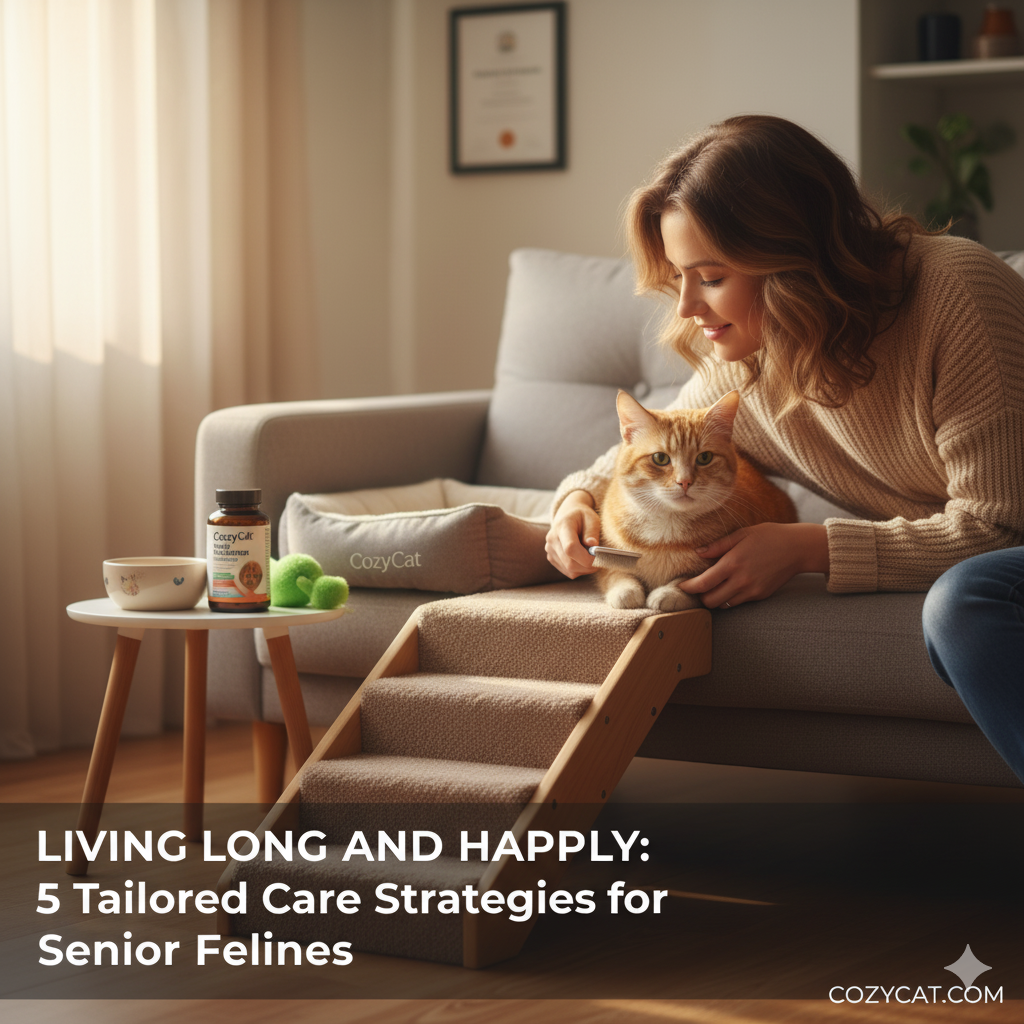
Living Long and Happily with Your Cat: 5 Tailored Care Strategies for Senior Felines Over 10 Years Old
Share
When a cat surpasses the age of 10, it officially enters its senior years, becoming a senior feline—the equivalent of a human in their mid-50s to 60s. Living a long life is a blessing in itself, but it requires thoughtful, customized care. Senior feline care strategies should focus not just on longevity, but on qualitative management to ensure the remaining time is spent living long and happily.
This article outlines 5 tailored care strategies that every owner of a senior feline over 10 should know to ensure their cat enjoys a comfortable and healthy golden age. We’ll connect these tips specifically with products from the CozyCat store, such as senior cat food/supplements, stairs, and joint support products.
🔍 Strengthen Regular Health Checks and Communication with Your Vet
Diseases progress very quickly in senior felines, and they have a strong instinct to hide signs of illness. Therefore, regular check-ups are the first step in any senior feline care strategy.
-
Check-up Frequency: Cats aged 7 and up should ideally have a check-up every six months. Blood tests, urinalysis, and dental exams can help detect common senior issues like kidney disease, hyperthyroidism, and diabetes early.
-
Behavioral Records: Keep detailed records of changes in appetite, water intake, litter box frequency, and activity levels at home. Subtle changes can be critical signs of health problems.
🍽️ Customized Nutrition: Choosing Senior Cat Food and Supplements
As cats age, their digestive capabilities and metabolism change. It's crucial to provide essential nutrients efficiently through specialized senior cat food/supplements.
-
High-Quality Protein: To prevent muscle loss (which is highly detrimental to cats), switch to senior cat food that contains easily digestible, high-quality protein. If kidney disease is present, consult your veterinarian for a low-protein diet.
-
Hydration: Encourage ample water intake by increasing wet food, providing multiple water bowls, or using a pet fountain to support kidney health.
-
Essential Supplements: Consider joint support products like senior feline supplements containing glucosamine or Omega-3 fatty acids to help alleviate joint pain and reduce inflammation.
Ensure Accessibility: Environmental Modification and Joint Support
Senior felines often struggle to jump up and down due to arthritis or muscle loss. To ensure they live long and happily, the physical environment must be adapted to their declining physical capabilities.
-
Safe Stairs: Install stairs or ramps next to beds or sofas—places your cat frequently accesses. This is one of the best joint support products to prevent strenuous jumps that strain their joints.
-
Easy-Access Litter Box: If the litter box entrance is too high, they may be reluctant to use it. Switch to a litter box with a low entry or an open-sided design to improve accessibility.
-
Warm, Comfortable Bedding: Provide a soft cushion or a low-heat electric pad for senior felines (who love warmth) to help relax their muscles.
🧠 Maintain Mental Stimulation: Adjusting Playtime and Cognitive Health
Even as physical activity decreases, mental activity must continue for them to live long and happily. This also helps prevent cognitive decline (feline dementia).
-
Short Play Sessions: Replace intense play with frequent, short, gentle play sessions (under 5 minutes). Encourage intellectual activity using puzzle toys with catnip or treat dispensers.
-
New Scents and Sounds: Safely introduce new smells (e.g., a blanket with outside scents) or sounds to stimulate brain activity.
-
Gentle Contact: Grooming assistance and massage strengthen the bond with the owner, while helping maintain circulation and joint flexibility.
🦷 Dental Care and Hygiene Checks: Pain-Free Comfort
One of the most common and painful issues for senior felines is dental disease. Oral pain can lead to appetite loss, which severely compromises overall health.
-
Regular Brushing: Consistent toothbrushing from a young age is key, but for senior felines, regular dental check-ups are necessary to determine if scaling is required.
-
Skin and Coat Care: As their self-grooming ability declines, owners must brush them daily with a soft brush to prevent matting and detect skin issues early.
-
Elimination Monitoring: Constantly observe their litter box use to ensure comfortable bowel movements and immediately address digestive issues like constipation or diarrhea.
💖 Conclusion: Love and Understanding are the Best Senior Care
These 5 senior feline care strategies are all efforts by the owner to ensure their senior feline can live long and happily with dignity and comfort. It's essential to use products like senior cat food/supplements, stairs, and joint support products appropriately, but above all, to use observation and understanding so you don't miss your cat's subtle signals. Create a radiant golden age together with your beloved cat.
Keywords : senior feline, senior feline care strategies, living long and happily, senior cat food/supplements, stairs, joint support products, senior feline health, feline dementia, feline arthritis
Related Search Terms : cat 10 years old, cat health check-up frequency, cat stroller, recommended cat supplements, senior feline environment setup
Family Sites : Bark&MeowCorner, CozyCat, BarkBoulevard, MiniMiracles, PetalPals, OfficeOrbit, MediLove, LuxeBloom, BeautySecrets, SerenityBeauty, FresFaceBoutique, PowerHouse, ChampionsChoice, OutlastOutdoors
